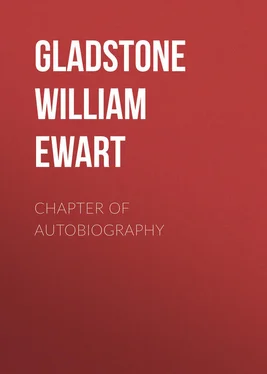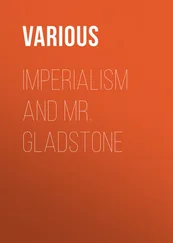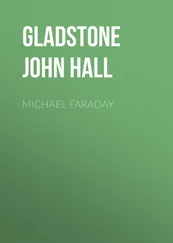William Gladstone - Chapter of Autobiography
Здесь есть возможность читать онлайн «William Gladstone - Chapter of Autobiography» — ознакомительный отрывок электронной книги совершенно бесплатно, а после прочтения отрывка купить полную версию. В некоторых случаях можно слушать аудио, скачать через торрент в формате fb2 и присутствует краткое содержание. Жанр: foreign_antique, foreign_prose, на английском языке. Описание произведения, (предисловие) а так же отзывы посетителей доступны на портале библиотеки ЛибКат.
- Название:Chapter of Autobiography
- Автор:
- Жанр:
- Год:неизвестен
- ISBN:нет данных
- Рейтинг книги:3 / 5. Голосов: 1
-
Избранное:Добавить в избранное
- Отзывы:
-
Ваша оценка:
- 60
- 1
- 2
- 3
- 4
- 5
Chapter of Autobiography: краткое содержание, описание и аннотация
Предлагаем к чтению аннотацию, описание, краткое содержание или предисловие (зависит от того, что написал сам автор книги «Chapter of Autobiography»). Если вы не нашли необходимую информацию о книге — напишите в комментариях, мы постараемся отыскать её.
Chapter of Autobiography — читать онлайн ознакомительный отрывок
Ниже представлен текст книги, разбитый по страницам. Система сохранения места последней прочитанной страницы, позволяет с удобством читать онлайн бесплатно книгу «Chapter of Autobiography», без необходимости каждый раз заново искать на чём Вы остановились. Поставьте закладку, и сможете в любой момент перейти на страницу, на которой закончили чтение.
Интервал:
Закладка:
I hope to derive material benefit, at some more tranquil season, from a consideration of your argument throughout. I am painfully sensible, whenever I have occasion to re-open the book, of its shortcomings, not only of the subject but even of my own conceptions: and I am led to suspect that, under the influence of most kindly feelings, you have omitted to criticize many things besides the argument, which might fairly have come within your animadversion.
In the mean time I hope you will allow me to apprise you that on one material point especially I am not so far removed from you as you suppose. I am not conscious that I have said either that the Test Act should be repealed, or that it should not have been passed: and though on such subjects language has many bearings which escape the view of the writer at the moment when the pen is in his hand, yet I think that I can hardly have put forth either of these propositions, because I have never entertained the corresponding sentiments. Undoubtedly I should speak of the pure abstract idea of Church and State as implying that they are co-extensive: and I should regard the present composition of the State of the United Kingdom as a deviation from that pure idea, but only in the same sense as all differences of religious opinion in the Church are a deviation from its pure idea, while I not only allow that they are permitted, but believe that (within limits) they were intended to be permitted. There are some of these deflections from abstract theory which appear to me allowable; and that of the admission of persons not holding the national creed into civil office is one which, in my view, must be determined by times and circumstances. At the same time I do not recede from any protest which I have made against the principle, that religious differences are irrelevant to the question of competency for civil office: but I would take my stand between the opposite extremes, the one that no such differences are to be taken into view, the other that all such differences are to constitute disqualifications.
I need hardly say the question I raise is not whether you have misrepresented me, for, were I disposed to anything so weak, the whole internal evidence and clear intention of your article would confute me: indeed I feel I ought to apologize for even supposing that you may have been mistaken in the apprehension of my meaning, and I freely admit on the other hand the possibility that, totally without my own knowledge, my language may have led to such an interpretation.
In these lacerating times one clings to everything of personal kindness in the past, to husband it for the future, and if you will allow me I shall earnestly desire to carry with me such a recollection of your mode of dealing with the subject; upon which, the attainment of truth, we shall agree, so materially depends upon the temper in which the search for it is instituted and conducted.
I did not mean to have troubled you at so much length, and I have only to add that I am, with much respect,
Dear Sir, Very truly yours, W. E. Gladstone. T. B. Macaulay, Esq.3, Clarges Street, April 11th, 1839.
My dear Sir,
I have very seldom been more gratified than by the very kind note which I have just received from you. Your book itself, and everything that I heard about you, though almost all my information came – to the honour, I must say, of our troubled times – from people very strongly opposed to you in politics, led me to regard you with respect and good will, and I am truly glad that I have succeeded in marking those feelings. I was half afraid when I read myself over again in print, that the button, as is too common in controversial fencing even between friends, had once or twice come off the foil.
I am very glad to find that we do not differ so widely as I had apprehended about the Test Act. I can easily explain the way in which I was misled. Your general principle is that religious non-conformity ought to be a disqualification for civil office. In page 238 you say that the true and authentic mode of ascertaining conformity is the Act of Communion. I thought, therefore, that your theory pointed directly to a renewal of the Test Act. And I do not recollect that you have ever used any expression importing that your theory ought in practice to be modified by any considerations of civil prudence. All the exceptions that you mention are, as far as I remember, founded on positive contract – not one on expediency, even in cases where the expediency is so strong and so obvious that most statesmen would call it necessity. If I had understood that you meant your rules to be followed out in practice only so far as might be consistent with the peace and good government of society, I should certainly have expressed myself very differently in several parts of my article.
Accept my warm thanks for your kindness, and believe me, with every good wish,
My dear Sir, Very truly yours, T. B. Macaulay. W. E. Gladstone, Esq., M.P.Faithful to logic, and to its theory, my work did not shrink from applying them to the crucial case of the Irish Church. It did not disguise the difficulties of the case, for I was alive to the paradox it involved. But the one master idea of the system, that the State as it then stood was capable in this age, as it had been in ages long gone by, of assuming beneficially a responsibility for the inculcation of a particular religion, carried me through all. My doctrine was, that the Church, as established by law, was to be maintained for its truth; that this was the only principle on which it could be properly and permanently upheld; that this principle, if good in England, was good also for Ireland; that truth is of all possessions the most precious to the soul of man; and that to remove, as I then erroneously thought we should remove, this priceless treasure from the view and the reach of the Irish people, would be meanly to purchase their momentary favour at the expense of their permanent interests, and would be a high offence against our own sacred obligations.
These, I think, were the leading propositions of the work. In one important point, however, it was inconsistent with itself; it contained a full admission that a State might, by its nature and circumstances, be incapacitated from upholding and propagating a definite form of religion. 2 2 'The State in its Relations with the Church,' ch. ii., sect. 71, p. 73. Editions 1-3.
"There may be a state of things in the United States of America, perhaps in some British colonies, there does actually exist a state of things, in which religious communions are so equally divided, or so variously subdivided, that the Government is itself similarly chequered in its religious complexion, and thus internally incapacitated by disunion from acting in matters of religion; or, again, there may be a State in which the members of Government may be of one faith or persuasion, the mass of the subjects of another, and hence there may be an external incapacity to act in matters of religion."
The book goes on to describe that incapacity, however produced, as a social defect and calamity. But the latter part of the work, instead of acknowledging such incapacity as a sufficient and indeed commanding plea for abstention, went beyond the bounds of moderation, and treated it as if it must in all cases be a sin; as though any association of men, in civil government or otherwise, could be responsible for acting beyond the line of the capabilities determined for it by its constitution and composition. My meaning I believe was, to describe only cases in which there might be a deliberate renunciation of such duties as there was the power to fulfil. But the line is left too obscurely drawn between this wilful and wanton rejection of opportunities for good, and the cases in which the state of religious convictions, together with the recognised principles of government, disable the civil power from including within its work the business of either directly or indirectly inculcating religion, and mark out for it a different line of action.
Читать дальшеИнтервал:
Закладка:
Похожие книги на «Chapter of Autobiography»
Представляем Вашему вниманию похожие книги на «Chapter of Autobiography» списком для выбора. Мы отобрали схожую по названию и смыслу литературу в надежде предоставить читателям больше вариантов отыскать новые, интересные, ещё непрочитанные произведения.
Обсуждение, отзывы о книге «Chapter of Autobiography» и просто собственные мнения читателей. Оставьте ваши комментарии, напишите, что Вы думаете о произведении, его смысле или главных героях. Укажите что конкретно понравилось, а что нет, и почему Вы так считаете.












